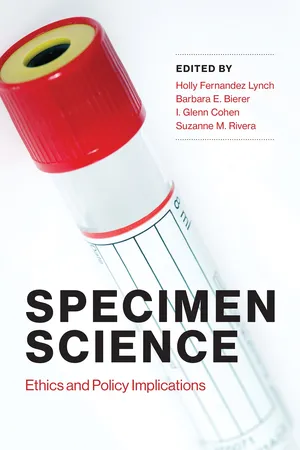
Specimen Science
Ethics and Policy Implications
- English
- ePUB (mobile friendly)
- Available on iOS & Android
Specimen Science
Ethics and Policy Implications
About this book
Advances in medicine often depend on the effective collection, storage, research use, and sharing of human biological specimens and associated data. But what about the sources of such specimens? When a blood specimen is drawn from a vein in your arm, is that specimen still you? Is it your property, intellectual or otherwise? Should you be allowed not only to consent to its use in research but also to specify under what circumstances it may be used? These and other questions are at the center of a vigorous debate over the use of human biospecimens in research. In this book, experts offer legal, regulatory, and ethical perspectives on balancing social benefit and human autonomy in biospecimen research.
After discussing the background to current debates as well as several influential cases, including that of Henrietta Lacks, the contributors consider the rights, obligations, risks, and privacy of the specimen source; different types of informed consent under consideration (broad, blanket, and specific); implications for special patient and researcher communities; and the governance of biospecimen repositories and the responsibilities of investigators.
Contributors
Rebecca A. Anderson, Heide Aungs, Avery Avrakotos, Mark Barnes, Jill Barnholtz-Sloan, Benjamin Berkman, Barbara E. Bierer, Mark A. Borreliz, Jeffrey R. Botkin, Dan Brock, Ellen Wright Clayton, I. Glenn Cohen, Lisa Eckstein, Barbara J. Evans, Emily Chi Fogler, Nanibaa' A. Garrison, Pamela Gavin, Aaron J. Goldenberg, Christine Grady, Kate Gallin Heffernan, Marylana Saadeh Helou, Sara Chandros Hull, Elisa A. Hurley, Steven Joffe, Erin P. Johnson, Julie Kaneshiro, Aaron S. Kesselheim, Isaac Kohane, David Korn, Russell Korobkin, Bernard Lo, Geoffrey Lomax, Kimberly Hensle Lowrance, Holly Fernandez Lynch, Bradley A. Malin, Karen J. Maschke, Eric M. Meslin, P. Pearl O'Rourke, Quinn T. Ostrom, David Peloquin, Rebecca Pentz, Jane Perlmutter, Ivor Pritchard, Suzanne M. Rivera, Erin Rothwell, Andrew P. Rusczek, Rachel E. Sachs, Carol Weil, David Wendler, Benjamin Wilfond, Susan M. Wolf
Tools to learn more effectively

Saving Books

Keyword Search

Annotating Text

Listen to it instead
Information
Table of contents
- Cover
- Series page
- Title page
- Copyright page
- Dedication
- Table of Contents
- Series Foreword
- Acknowledgments
- Introduction
- I Background and Foundations
- II Roots of the Debate: Autonomy, Justice, and Privacy
- III Consent and Its Implications
- IV Special Populations and Contexts
- V Governance, Accountability, and Operational Considerations
- Contributors
- Index
- Basic Bioethics
Frequently asked questions
- Essential is ideal for learners and professionals who enjoy exploring a wide range of subjects. Access the Essential Library with 800,000+ trusted titles and best-sellers across business, personal growth, and the humanities. Includes unlimited reading time and Standard Read Aloud voice.
- Complete: Perfect for advanced learners and researchers needing full, unrestricted access. Unlock 1.4M+ books across hundreds of subjects, including academic and specialized titles. The Complete Plan also includes advanced features like Premium Read Aloud and Research Assistant.
Please note we cannot support devices running on iOS 13 and Android 7 or earlier. Learn more about using the app